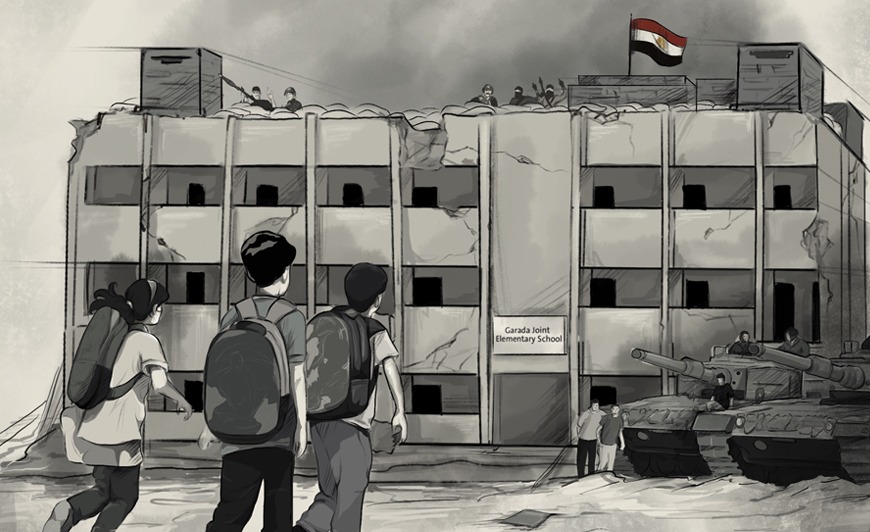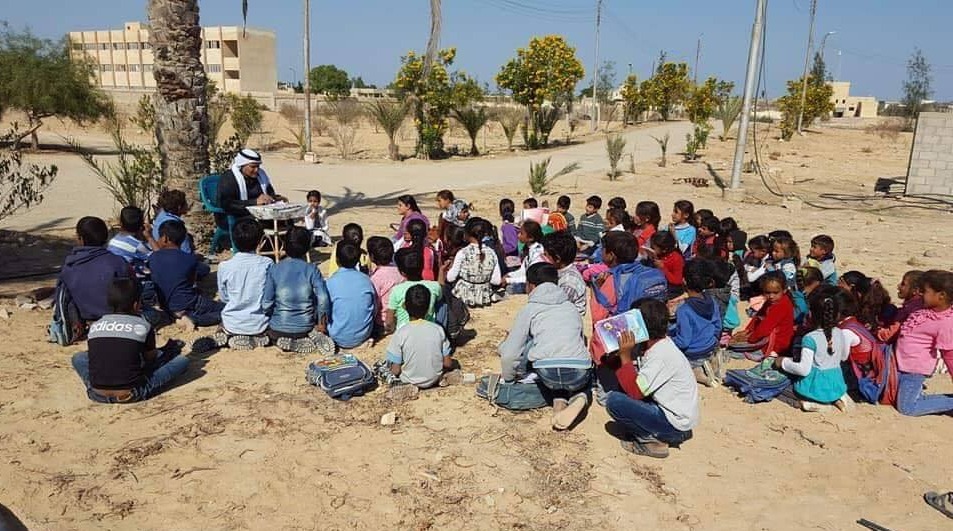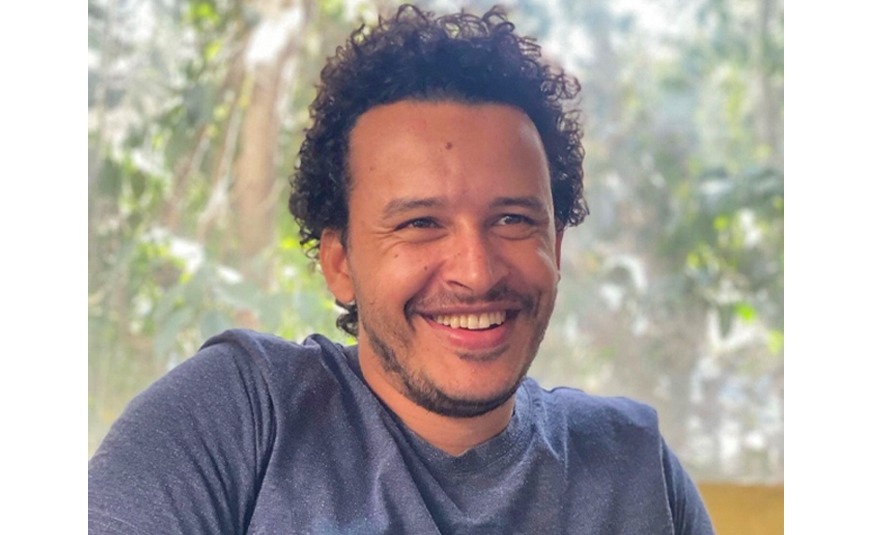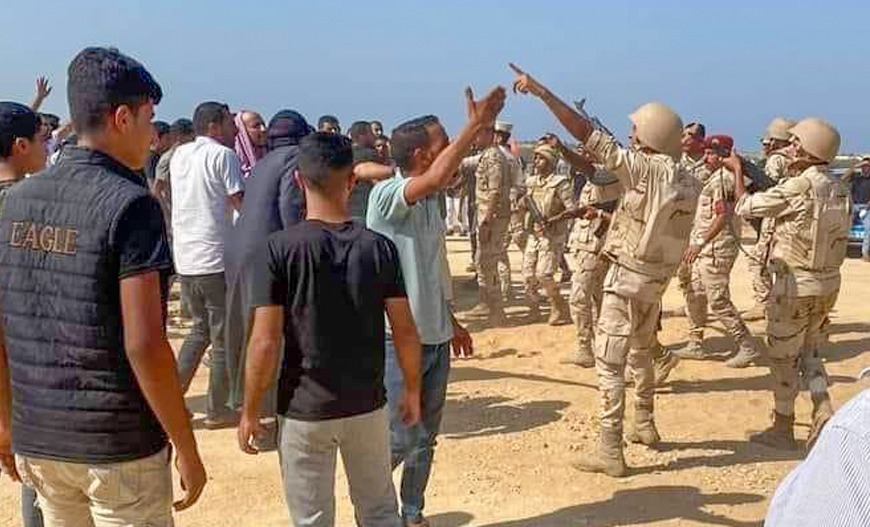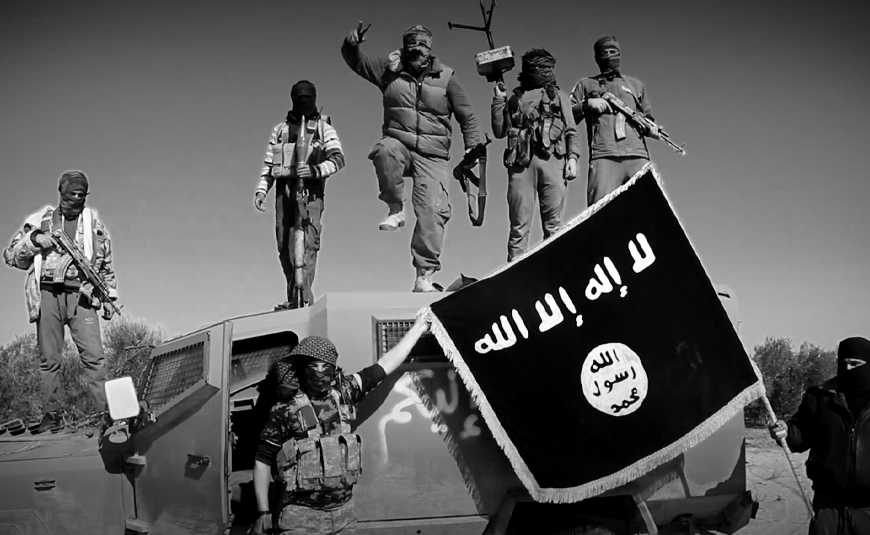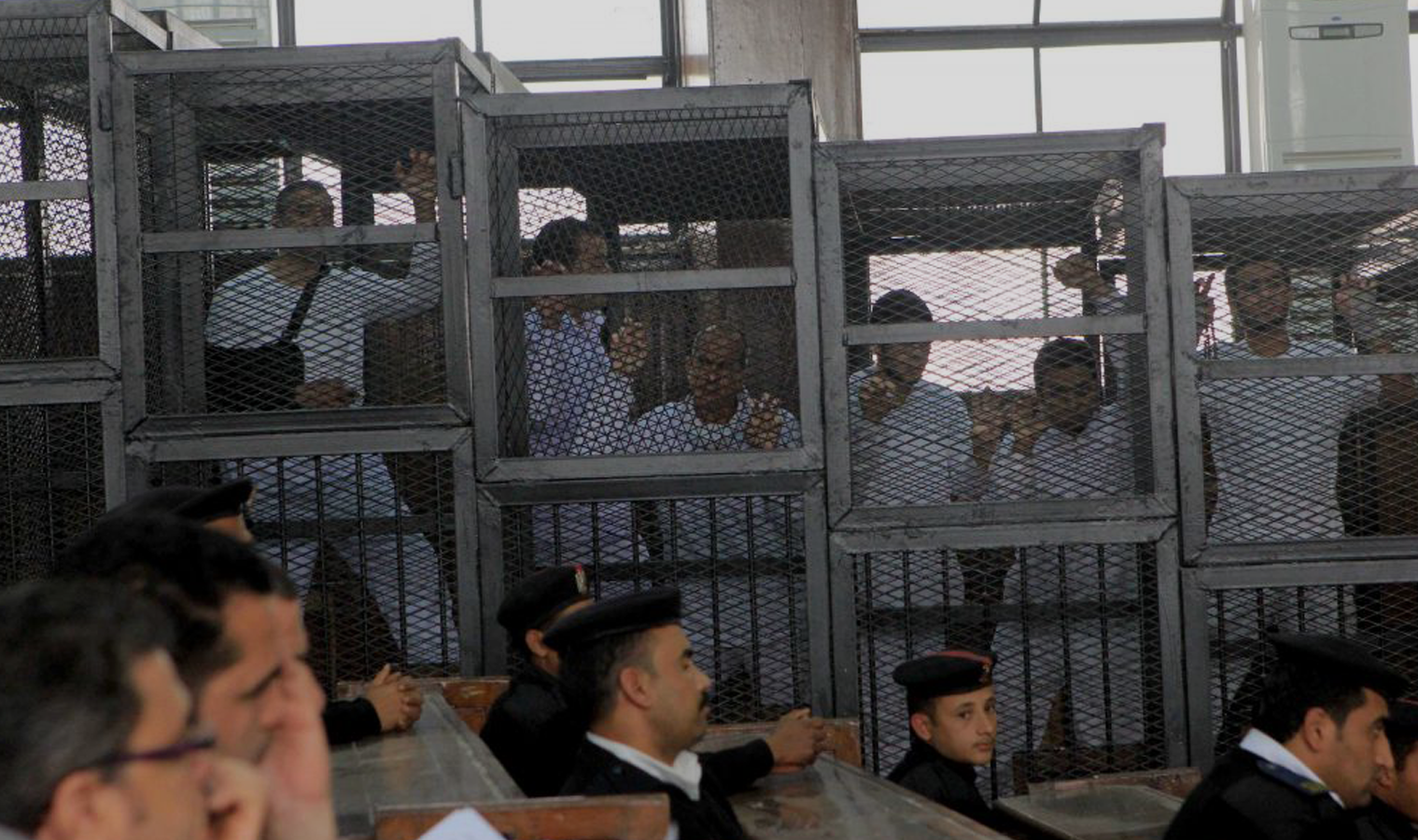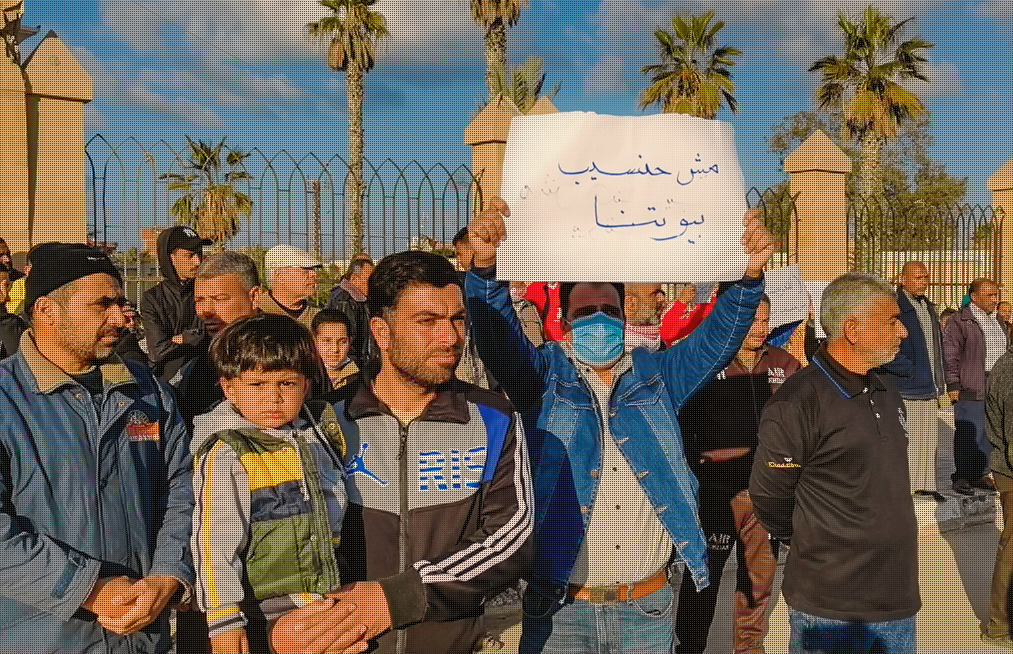
Stop the Displacement Plans Around Port of al-Arish For the Benefit of Everyone
The Sinai Foundation for Human Rights stated today that a decree recently issued by President Abdel Fattah al-Sisi designates around 542 feddans of land in al-Arish as Armed Forces public benefit work lands. This technically means swallowing up more of the area’s lands and the imminent displacement of thousands of families in the region as part of vague unjust military plans that evacuated North Sinai of thousands of inhabitants in the past few years under a cover of excuses that do not consider the necessary safeguards regarding forced displacement according to the International Human Rights Law.
Presidential decree number 465 for the year 2021 was issued and published in the official paper on 16 October 2021 without offering any explanation and it stated the transfer of control of Port of al-Arish and expropriation of the lands surrounding the port needed for the expansion works to the Egyptian armed forces. The government says that the evacuation of that area is needed to develop Port of al-Arish, while citizens and specialists say that the Egyptian government did not respect the Egyptian constitution and law and that there are multiple other solutions that were not studied or taken into consideration.
Ahmad Salem, executive director of the Sinai Foundation for Human Rights, said:
The Egyptian government needs to stop its plans that aim to evacuate the area of Port of al-Arish of its inhabitants, as the military already displaced tens of thousands of North Sinai inhabitants with justifications that were in many instances hollow, actually burdening the displaced inhabitants with suffering, displacement, and oppression in an environment of widescale oppression and absence of any community dialogue with affected inhabitants regarding the decisions that affect their lives.
Al-Sisi’s decree contained a map that shows that the area intended to be evacuated – after reallocating it to be property of the Armed Forces – is around 542 feddans surrounding Port of al-Arish. The Sinai Foundation for Human Rights reviewed the map and coordinates attached to the decree published in the official paper issue 41 bis (A) on 16 October 2021 and found that the area planned to be evacuated will include several residential neighborhoods in al-Arish. The decree technically means that the first financial beneficiary of the port development project is the armed forces, despite the fact that the presidential decree assigns the funding, execution, and management of the project to the Suez Canal Economic Zone, which is a special economic zone. This opens the door wide for corruption in the absence of any independent or real oversight over the economically beneficial works related to the armed forces. Since January 2014, the assets of Port of al-Arish, including the wharves and most of the port’s lands, as well as the port administration, were transferred to the Ministry of Defense in place of the Port Said Port Authority, according to a decree issued by acting president Adly Mansour.
Al-Sisi’s decree number 465 for the year 2021 came as a modification to previous presidential decree number 330 for the year 2019 issued in July 2019, which stated that the area desired to be evacuated around Port of al-Arish is around just 371 feddans, meaning that al-Sisi’s new decree in October 2021 increased the area desired to be evacuated by a percentage reaching 46%. The foundation estimates the number of local inhabitants whose lands and houses will be expropriated to be 25 thousand persons (6000 families).
Photographs acquired by the foundation, as well as satellite images, show that Egyptian military forces started building a series of walls about 6 meters high surrounding the area specified in decree 465. The foundation’s analysis also shows that the commencement of construction of those walls came months before the issuing of the decree.
The Sinai Foundation for Human Rights had warned in a release issued at the beginning of 2021 of intentions the Egyptian government had to expand the expropriation procedures in the Port of al-Arish region and stated that the government seemingly will not be adhering to the coordinates specified in decree 330 for the year 2019, and will instead expand the displacement plans to outside the specified coordinates, which was recently confirmed after al-Sisi’s decree number 465 for the year 2021.
The Egyptian constitution forbids in article 63 “All forms of arbitrary forced migration of citizens” and considers the violation of such “a crime without a statute of limitations.” The International Human Rights Law strictly forbids forced displacements except in special circumstances and with guarantees, most or all of which were violated by the Egyptian government.
The government’s plans to evacuate the Port of al-Arish surroundings led to criticism by members of parliament, and rare protests and demonstrations in North Sinai documented by the Sinai Foundation and other platforms in the past months, where the inhabitants spontaneously gathered more than once to protest the process of house numbering in preparation for their demolition or evacuation. The Sinai Foundation previously published videos of some of the protests. Some inhabitants also hung up banners refusing the removal of their houses, in addition to launching hashtags on social media platforms in opposition to the plans.
A current government official in the maritime transport sector criticized the decision to evacuate the Port of al-Arish region in a past interview with the Sinai Foundation, providing that their name is not mentioned. The official said:
“The most strategically feasible solution is to build a new port outside the residential clusters of al-Arish, as there are around 200 meters of unutilized coasts in North Sinai, especially the areas west of Sheikh Zuwayed or west of al-Arish which are very promising areas that can be easily connected by a commercial road network that connects the port with the heavy industry area in central Sinai. Plus, the construction of a new port would spare the government the costs of compensations to be paid to affected persons”.
He added:
The construction of a new port would provide a real chance to build the port according to standard criteria when it comes to the operational level, storage capacity, and the possibility of rearranging service locations or future expansions, which are considerations hard to accomplish and take into account in the current port which was constructed in 1987 as a fishing port before presidential decree 221 for the year 1996 was issued to turn it into a commercial port”.
This agrees with what a number of members of the Egyptian parliament presented regarding North Sinai in a briefing request in 2019.
In the most recent meeting between the governor of North Sinai, Major General Mohamed Abdel-Fadil Shousha and a large number of the port area inhabitants on 19 February 2022, videos of which were shared by attendees on Facebook, the governor faced vicious opposition by attendees, and Major General Shousha appeared in the video saying:
Message received that people don’t want compensation and want to keep their lands. I will deliver this [to political leadership].
An affected citizen said after the meeting while standing next to the governor in the video that the governor will present “the suggested alternatives to move the port to a new location.” Member of the parliament representing North Sinai, Rahmy Bakir, also shared photographs from the same meeting in a statement on his Facebook page where he said that people refused compensation and insisted on keeping their houses.
It seems that the governor’s meetings with citizens are mere attempts to buy time, as the government seems to be determined to move forward with the forced evacuations. A few days after meeting with the locals and promising to deliver their refusal to leave their homes and offering alternative suggestions for the port development project to the government, the governor of North Sinai himself stated in an interview with the North Sinai radio station that
The port project is a national project, and we all heard the president talking about those projects yesterday. He confirmed that when a project opens a new vein of life, there need to be house removals. I plead to the citizens that this is in the public interest. The Military Operations Authority formed a committee of more than 12 specialized authorities to research the four alternative propositions to build al-Arish Port in two areas east of al-Arish and two areas west of al-Arish but with taking the size of the operations over 50% of which were executed and the plans for them to be done and for the port to be opened at the end of the year into consideration.
Both the International Human Rights Law (applied in the case of peace) and the International Humanitarian Law (applied in the case of war) generally prohibit forced eviction and the destruction of houses except in certain exceptional cases, like ensuring citizens’ safety from imminent environmental dangers or armed attacks. The International Law only permits governments to resort to forced eviction as a last resort, in case there were no other solutions, and only within strict safeguards that guarantee proportionality, reasonability, transparency, prior discussion with the locals, and the consideration of all other solutions and alternatives. In case of the impossibility of avoiding eviction, governments are to transparently offer fair compensation before the evacuation, and the locals are to be notified a reasonable amount of time ahead of the evacuation (at least weeks) and to be helped find suitable replacements for their accommodation by the government, as well as alternative jobs and sources of income, and ensuring the continuity of education of children. The International Law also states that land cannot be only compensated with money, but also with replacement land with similar properties that maintain the lives of the citizens, their customs, and traditions to the fullest possible extent.
The International Law also requests that governments allow citizens to return to their homes once it is possible. In the case of forced displacement under the pretense of development and urban or economic expansion, in addition to all the previous safeguards, governments must study alternative solutions, which did not happen in the case of Port of al-Arish.
Generally, through the escalating forced displacements by the military in North Sinai since 2013, the armed forces did not significantly consider any of those standards. Citizens of the port area in particular fear their fate being like that of hundreds of families displaced by the military with no or unjust compensations that cannot be appealed in court or through any independent judicial process as stated in the International Law.
Salem stated:
The Egyptian military has since 2013 displaced tens of thousands of Sinai civilians and destroyed their houses with the claim of securing the area, and now it is very close to displacing thousands of others under the pretense of development, instead of studying the various available options and discussing them with those this concerns: The people of Sinai themselves. If the goal was development for the sake of the people of Sinai, the government needs to include and listen to them.
For more details and legal analysis, read below:
1- Background on demolition operations in North Sinai:
The city of al-Arish is the capital of North Sinai governorate and its civilian metropolis with the largest population count of 192,472 according to the Central Agency for Public Mobilization and Statistics data in 2017. It has faced, like other areas in North Sinai, during the past years, government procedures that led to the displacement of thousands of local inhabitants. The most prominent of those procedures was the president’s decision to establish a buffer zone around al-Arish airport which led to the demolition of hundreds of houses and destruction of thousands of feddans of farmland which were sources of income and work opportunities to a large sector of citizens. In addition to disconnecting the city and besieging it inside a huge concrete wall resembling the border wall with Gaza Strip, separating the inhabitants inside the city from its agricultural and industrial areas after shutting down the industrial area southwest of the city due to the war on terrorism.
The group punishment measures during the Comprehensive Operation – Sinai 2018 the military practiced against citizens created an additional burden on the displaced and evicted civilians or civilians who stayed on their lands, as fishermen living in al-Arish were forbidden to practice their profession and source of income, despite fishermen from other governorates being allowed to fish on the coasts of al-Arish in a discriminatory decree issued by the Minister of Defense. A government decree to construct three new highways in the heart of the city which the government started executing in February 2021 – and construction work is still ongoing – also was a new shock to local citizens, as hundreds of houses were marked to be demolished, which is a project the governor of North Sinai stated in a radio interview in April 2021 was the idea of president Abdel Fattah al-Sisi himself.
The serious violations that took place during the forced displacement of the people of Rafah and Sheikh Zuwayed are a huge concern for the people of al-Arish, as hundreds of families displaced since 2014 have not been compensated till now or have not been compensated appropriately.
On another note, armed forces authorities, especially the engineering authority, entirely dominate development and construction projects in North Sinai, as no civilian companies seem to undertake any projects there. Media reports reported on how the Armed Forces subcontract other companies to execute the projects, which opens the door wide to corruption.
Some media outlets close with opposition groups connected the port project to what is known as the Deal of the Century or the Egypt-Israel efforts to soothe the situation for the people of the blocked Gaza Strip through an economic outlet in North Sinai overseen by the Egyptian military.
2- More legal analysis:
In addition to criminalizing forced displacement in the Egyptian constitution and the International Human Rights Law, there are many laws that the Egyptian authorities did not seem to consider while planning the project, including the Environmental Law and its executive regulation, for example. But we stop at the main law concerned with issues of expropriation and compensation.
Law 10 for the year 1990 on the “expropriation of real estate for public-interest projects” states that any government decision on expropriation must include a warrant explaining “the project the execution of which is required including the amount of initial compensation needed to be deposited in the account of the party executing the expropriation” within 6 months from the issuing of the expropriation order. The same law also states that the warrant is to be published in the official paper.
This means that President al-Sisi or who he delegates had to publish in the official paper a descriptive warrant during 6 months from the issuing of the expropriation decision in July 2019, so January 2020 at the latest, and for the warrant to describe the port development project and the studies and procedures taken into consideration. The warrant also needed to have specified the initial sum allotted for compensations to the armed forces or the government authority responsible for the expropriation. According to law 10 for the year 1990, the sum dedicated to the compensations is to be paid to the party responsible for the expropriation procedures and is to be deposited in its bank account by the party requesting the expropriation.
None of al-Sisi’s decrees regarding al-Arish port specified who the authority responsible for the expropriation is, where the decrees could be understood as the armed forces are the authority requesting the expropriation where the land ownership was transferred to the armed forces according to al-Sisi’s 2019 decree, and that the local authorities related to the relevant ministries are the ones in charge of the expropriation. However, the inhabitants stated in several testimonies given during previous and later forced evictions that armed forces officers were present with house and land survey committees. Although compensations in previous forced evictions in Sinai were issued by the Rafah, Sheikh Zuwayed, and al-Arish municipal councils.
The absence of this explanatory warrant and official data led to conflict and fear regarding the absence of compensations or their disproportionality. Especially with the conflict in the Governor of North Sinai Major General Mohamed Abdel-Fadil Shousha’s statements in several meetings with citizens and other official statements he made regarding the conditions for eligibility to compensations and their sums. Law 10 for the year 1990 states that compensations are to be calculated according to the market prices at the time of the expropriation, plus at least 20%.
On 8 February 2022, the Cabinet Media Center issued a brief statement – according to the governor of North Sinai – saying that the compensations regarding the al-Arish port project will be issued before the commencement of the evacuation process. The statement mentioned that the compensations include alternatives, including “the citizen’s acquisition of a fair financial compensation for the price of land and structures, or the acquisition of substitute residential units provided by the governorate in the area of al-Risa, or a piece of land with an area of 120 meters in al-Risa area.” The statement did not mention what the fair compensations would be or how they is calculated.
3- More citizen testimonies:
The Sinai Foundation for Human Rights team met with a number of local citizens at risk of expropriation of their houses in al-Arish. The Sinai Foundation presents these testimonies below on behalf of the speakers, with some personal information adjustments to keep their identities anonymous.
Mrs. L. H
"I am 40 years old from al-Risa neighborhood. My husband and I worked hard to buy a piece of land. We are simple people, my husband worked hard and had to be away for work for years. I consoled him and told him that it was worth it to buy a piece of land and build a house and live together in peace. I swear he was away for more than 10 years, and I was alone. We bought a piece of land 4 years ago, and we haven’t even built a house on it yet. We would say, it’s fine, a couple more steps and we can rest after all the hard work. When we saw the decree, we resigned ourselves to Allah. I just kept saying alhamdulillah. My husband was transported to the hospital from grief. They took all his hard work, I swear 10 years away, depriving himself and limiting us to buy the land, and when I told him to wait till we see about the compensation, he said compensations are pennies for lands with no buildings. What is worth more, the port or poor citizens? Is it worth killing us to build a port!
North Sinai representatives made suggestions to the government of other areas to build a new port and they were all rejected. As long as there are other places that could work, why don’t they leave us alone? The people of Sinai are tired and have nowhere to turn. We have been suffering our whole lives, and since 2014 things have become so hard and they keep saying the development project in Sinai. Who are you developing it for?”
Mrs. W. M
I am over 50 years old. A mother and a grandmother. My whole dream was a place to keep me, my children, and grandchildren, together. My husband was a good man and he died. I collected my and my son’s inheritance and we built a beautiful two-story building with a garden where I planted fruit. We live in it, nine of us. We were shocked by the decree. We don’t know the evacuation date or what will happen, and no one talked to us about compensations, and we don’t know where we’d go. The family will be homeless, I swear we have nowhere to go. We never took anything from the government, even when my children graduated, they didn’t get government jobs, and my son moved away to work. This building was all my inheritance, my gold jewelry, and my son’s years away and all his hard work. We are much smaller than to be contacted by any officials to tell us what to do or what the compensations they speak of would be. The people of Rafah have been waiting for 8 years and no one contacted them or investigated or reviewed the situation, and in the end, they say the government gives fair compensations. Will they give me the million pounds I paid?
If they compensated us after 8 years like the people of Rafah, where would I leave my beautiful house with my children and grandchildren and go? My son’s salary is 4 thousand pounds he uses to support us. How is he supposed to pay rent? Representatives keep talking and the government wouldn’t listen. The government does what they want and what they see benefits them, doesn’t matter who gets hurt or gets trampled in the process. The strange thing is, I loved my country, but they’re killing us. We have become impotent, and we can't complain or say anything. We can only complain to Allah.
Mrs. R. E
I’m from al-Arish and I have been living in al-Risa neighborhood since 2008. My husband has lived in this area since 1982 and he’s the youngest of his siblings, so his older siblings have been in al-Risa for 65 years. We own the land, not the government. We are affected but all we want is for the representatives’ voices to be heard. If we left al-Risa for anywhere safe, no one should make us leave again, because our neighbors in al-Risa are originally from Rafah then were evicted and bought a place in Sheikh Zuwayed then were evicted and bought a place in al-Risa, and after the president’s port area decree, it would be their third time being expropriated. We don’t want this to happen to us. We want them to tell us the places they don’t want because it would be terrible for us to work hard and for all our life’s work to go to waste again time after time. If only officials would talk to us.
A survey committee came from the governorate office and surveyed the houses with people from the military, took the measurements for the houses and photographed all of them from the outside and the inside, and till now we don’t know anything about compensations. I asked the committee when they surveyed my house about when the compensation would be issued and how much it would be, and they said they didn’t know, and that the information was secret. The committee came to my house around March 2021, and it consisted of municipal council personnel, people from the military and from the first (al-Arish police) station, and engineers from the housing directorate. We are 7 people living in a house that’s not too large, and the government valued the house, and we have no other place to go if they kick us out. We don’t know if the compensation they’d give us would be enough to buy a new house to live in or if what happened to the people of Rafah and Sheikh Zuwayed will happen to us.


